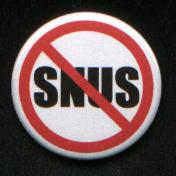 November 28, 2008 - Sweden's trade minister Ewa Björling has called on the European Union to let loose the snus (Swedish style moist snuff). As smokers all over Europe are left to shiver with their cigarettes outside the doors of pubs, bistros and offices, Sweden has sensed an opportunity to mount a challenge to the infinite wisdom of the European Commission.
November 28, 2008 - Sweden's trade minister Ewa Björling has called on the European Union to let loose the snus (Swedish style moist snuff). As smokers all over Europe are left to shiver with their cigarettes outside the doors of pubs, bistros and offices, Sweden has sensed an opportunity to mount a challenge to the infinite wisdom of the European Commission.
Dr. Gunilla Bolinder, Director of Education at Stockholm's Karolinska University Hospital points out, "To sing the praises of SNUS is a deathblow to over 20 years of hard tobacco preventive work. SNUS only saves the life of the tobacco industry" (SNUS gets the thumbs-down NEWS-24 1/31/2007).
Except for Sweden, snus is outlawed by the European Union (EU) (in May, 1992) mainly because it was believed it would be used above all by young people, and that oral tobacco contained particularly large quantities of carcinogenic substances. (The use of snus is a vital component of the Swedish heritage - its use dating back over 200 years.) The EU ban does not include chewing tobacco or tobacco for smoking.
Bans have been placed on smokeless tobacco products in a number of countries, including Australia (in 1991), Israel, Hong Kong, New Zealand, Taiwan, Singapore, Japan, Saudi Arabia, Bahrain, Kuwait, Oman, Qatar and the United Arab Emirates.
Related news briefs: Royal College of Physicians still pushing the use of SNUS..; Our Kids are still our number one priority..; EU Scientific Committee Concludes: Insufficent Evidence to Lift Ban on SNUS..; EU officials said that Snus might appeal too much to young people..; Snus snub for Sweden at EU court...
There are many more news briefs that provide reason we can't allow the expansion of snus sales (Do a random search..) Snus appeals to young adults and kids that want to be young adults and not inveterate (hard-nose, long-established, deep-rooted) smokers. Adolescence is a critical time for brain growth and nicotine alters normal brain development. Surely every parent wants their child to reach there full potential and not being an addict dependent on nicotine their whole life.
Reference: Trade minister vows to snuff out EU snus ban, The Local, 11/28/2008.
Read more...
Bringing the World of Tobacco Control closer together..
SNUS Ewa Björling, Sweden's trade minister more concerned with sales than health..
Cigarettes “fire safe” in Minnesota as of December 1, 2008..
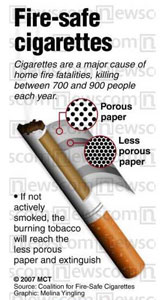 November 28, 2008 - Fire-safe" cigarettes have hit the shelves in Minnesota, complying with a new state law that goes into effect on December 1, 2008.
November 28, 2008 - Fire-safe" cigarettes have hit the shelves in Minnesota, complying with a new state law that goes into effect on December 1, 2008.
The new law requires all cigarettes sold in the state to be self-extinguishing if left unattended. The most common technology used by cigarette manufacturers is to wrap the cigarette in three thin bands of less porous paper which act as "speed bumps" and make the burning of the tobacco slow down and eventually go out.
Minnesota joins New York, Vermont, California, Illinois, New Hampshire, and Massachusetts in adopting "fire-safe" laws.
Reference: Cigarettes now “fire safe” in Minnesota, Tobacco Journal International, 11/27/2008.
Related news brief: Fire - Safe Cigarettes for all 50 states - NOW... For other news briefs do a random search..
Read more...
Canada - Police arrest 46 in tobacco crackdown..
 November 27, 2008 - Royal Canadian Mounted Police (RCMP) have arrested 46 people and seized more than 9 million cigarettes as part of a crackdown on contraband tobacco smuggling. Also seized was 2,332.3 kilograms of fine cut tobacco and 50 cartons of peach flavor light cigars. The offenders departing the Cornwall, Ontario area towards Montreal, Toronto and Ottawa were identified and intercepted.
November 27, 2008 - Royal Canadian Mounted Police (RCMP) have arrested 46 people and seized more than 9 million cigarettes as part of a crackdown on contraband tobacco smuggling. Also seized was 2,332.3 kilograms of fine cut tobacco and 50 cartons of peach flavor light cigars. The offenders departing the Cornwall, Ontario area towards Montreal, Toronto and Ottawa were identified and intercepted.
In February 2008 RCMP also disrupted the contraband tobacco supply chain seizing 9.5 million cigarettes and 800 kilograms of fine cut tobacco.
Reference: Forty-Six People Arrested for Possession of Contraband Tobacco during High Intensity Enforcement Project, Canada Newswire, 11/28/2008.
Related news briefs: Imperial Tobacco Survey - Canadian Illegal Tobacco Trade..; Canada - Introduction of Tobacco Stamp to combat contraband .. and Canada tobacco firms admit aiding smuggling...
Read more...
Jakarta, Indonesia - Malls help enforce non-smoking ban..
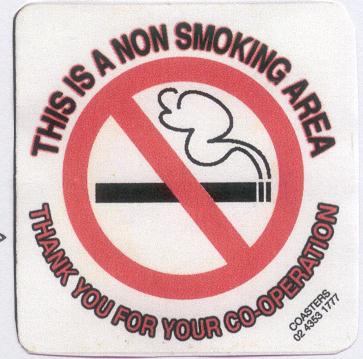 November 27, 2008 - JAKARTA: The Indonesian Shopping Center Association (APPBI) will help the city administration enforce smoking restrictions by asking its members to provide smoking rooms on their premises. Andreas Kartawinata, APPBI Jakarta chairman, said around 80 percent of APPBI members had smoking rooms. He said he would send letters to the remaining members to encourage them to adhere to the regulation.
November 27, 2008 - JAKARTA: The Indonesian Shopping Center Association (APPBI) will help the city administration enforce smoking restrictions by asking its members to provide smoking rooms on their premises. Andreas Kartawinata, APPBI Jakarta chairman, said around 80 percent of APPBI members had smoking rooms. He said he would send letters to the remaining members to encourage them to adhere to the regulation.
"Each shopping mall is different. We can't force them to follow the bylaw because constructing a smoking room can cost up to Rp 30 million (US$2,500). It's expensive."
He said a lot of money was needed to install exhaust fans, separate air-conditioning systems and seats for smokers. Plaza Semanggi is one mall declaring itself a smoke-free zone. It has three smoking rooms located on the first three floors.
Budirama Natakusumah, Jakarta Environmental Management Board head, said his office would continue to cooperate with other malls in implementing the bylaw. "We will soon cooperate with malls in Blok M and Grogol," he said.
Reference: Malls help enforce non-smoking ban,
JakartaPost.com, 11/26/2008.
Related news briefs: Indonesia - federal anti-smoking laws in one year - MAYBE..; Indonesia - NGO's (non-government organizations) Demand the Government Ratify WHO's FCTC.; Indonesia to raise cigarette tax by 6 to 7% in 2009..; Surabaya, Indonesia - anti-smoking bylaw 10/2009 - FOR REAL??; Indonesians smoking more than ever before..; Indonesia further rise in the excise tax would hurt the cigarette industry..; Alicia Keys - Jakarta Concert (July 31st) tobacco companies forced to withdraw sponsorship.. and Most Indonesians support moves to ban tobacco advertisements...
Read more...
India - placing pictorial warnings on tobacco products delayed again..
 November 26, 2008 - The pictorial warnings on all tobacco products that were supposed to become mandatory from 30 November 2008 in India, were, again delayed - reportedly due to hectic lobbying by the industry allies and other entities like the beedi growers' association.
November 26, 2008 - The pictorial warnings on all tobacco products that were supposed to become mandatory from 30 November 2008 in India, were, again delayed - reportedly due to hectic lobbying by the industry allies and other entities like the beedi growers' association.
Pictorial warnings on tobacco products have been delayed, at least, seven times. Over past years there were consistent efforts to water down the implementation of the tobacco control policies in India. Studies indicate that large, graphic warnings on cigarette packages are an effective means of increasing health knowledge among smokers. Not only do warnings present new information to smokers, but they also provide constant reminders given their frequency of exposure: pack-a-day smokers are potentially exposed to the warnings more than 7,000 times a year.
Before going to the 3rd Conference of Parties (COP3) to the global tobacco treaty (Framework Convention on Tobacco Control), the Indian Ministry of Health and Family Welfare had revealed before the Central Information Commission that tobacco industry is putting "pressure" to relax the tobacco control policies (source: The Hindu, 14 November 2008).
Reference: Another Blow to Enforcement of Tobacco Control Policies in India by Bobby Ramakant, News Blaze, 11/26/2008; COP3 - Third session of the Conference of the Parties, WHO Framework Convention on Tobacco Control (WHO FCTC), November 17-22, 2008.
Other related news briefs: India - Heavy Fines If You Smoke In Public Places..; More people in India die due to smoking bidis than all other forms of tobacco combined.. and WHO Report on the Global Tobacco Epidemic 2008...
Euromonitor: Tobacco in India..
Read more...
Don't patronize places where people are smoking..
 November 25, 2008 - Do you care about your health?? Do you want the best for your children??
November 25, 2008 - Do you care about your health?? Do you want the best for your children??
Mayo Clinic Dr. Paul Scanlon specializes in lung diseases related to smoking. He says smoking and secondhand smoke (SHS, passive, side stream, involuntary) increase your risk of many illnesses including lung cancer, emphysema and heart attack. Heart attack is an issue because exposure to cigarette smoke increases the tendency for blood to clot. Acute heart attacks happen when blood clots in the coronary arteries. Smoking bans are thought to help decrease your risk of heart attack from exposure to cigarette smoke.
A study out of the University of California looked at the heart attack rates in several cities across the us, Canada and Europe where smoking bans are in effect. Pueblo Colorado, Helena Montana, Saskatoon, Saskatchewan Canada to name a few. Results showed that in those cities, heart attack rates dropped by 19%. That's almost one out of five people who might have had a heart attack didn't.
David Sutton, a spokesman for Philip Morris USA said the company believes the public "should be guided by the conclusions of public health officials regarding the health effects of secondhand smoke" and "particular care should be exercised where children are concerned." Bill Phelps, a spokesman for the nation's largest cigarette maker, Philip Morris USA, said the company's website points out that public health officials have shown that secondhand smoke causes heart disease in nonsmokers. Phelps: "We agree that people should be able to avoid being around secondhand smoke, particularly in places where they must go."
Kids exposed to smoke are at higher risk of disease (possibly lifelong) since they breath in more air by weight than adults. World Asthma Awareness Day..".
The Surgeon General has concluded that no risk-free level of SHS exposure exists; the only way to fully protect nonsmokers is to completely eliminate smoking in indoor spaces.
Reference:
Smoking Bans - Do they work? by KSPR News, 11/24/2008.
A couple related news briefs: Massachusettes - Smoking ban drop in fatal heart attacks.. and Banning smoking a public health issue not property rights...
Click on image to enlarge..
Read more...
Indonesia - federal anti-smoking laws in one year - MAYBE..

November 25, 2008 - House of Representatives and an influential ulema group (Indonesia Ulemas Council (quasi-government council of Muslim scholars) - give guidance on many issues including smoking for Moslems) calling for anti-smoking laws.
Anti-smoking groups have repeatedly called on the government to take measures to reduce cigarette consumption in the country. The government has rejected the request, citing the millions of jobs that would be at stake in the sector.
Legislator Atte Sugandi of President Susilo Bambang Yudhoyono’s Democratic Party said Monday, 11/24/2008 a bill being pushed for deliberation by the House would curb tobacco-related advertising, promotions, sponsorships, production and sales. The House will set up a special committee before the year’s end to deliberate the bill, a move that has been delayed for three years. Atte said, "We expect to pass the bill (with 87 articles)before our term ends next year.”
The grip of the influential and strong tobacco industry on government may at last be broken. WE WILL HAVE TO SEE..
Reference: House, ulema push for anti-smoking laws by Adianto P. Simamora, The Jakarta Post, 11/25/2008.
Related news briefs: Indonesia - NGO's (non-government organizations) Demand the Government Ratify WHO's FCTC.; Indonesia to raise cigarette tax by 6 to 7% in 2009..; Surabaya, Indonesia - anti-smoking bylaw 10/2009 - FOR REAL??; Indonesians smoking more than ever before..; Indonesia further rise in the excise tax would hurt the cigarette industry..; Alicia Keys - Jakarta Concert (July 31st) tobacco companies forced to withdraw sponsorship.. and Most Indonesians support moves to ban tobacco advertisements...
Read more...
West Virginia another Camel SNUS test market..
 November 24, 2008 - More comments on R.J. Reynolds Tobacco moist snuff product Camel SNUS.
November 24, 2008 - More comments on R.J. Reynolds Tobacco moist snuff product Camel SNUS.
Reynolds is confident its new product will find a following. It launched Camel Snus in Austin, Texas, and Portland, Ore., in 2006, and has since expanded to test markets nationwide, with customers in nearly every state. Early next year, it's taking Camel Snus national with a marketing blitz that Reynolds spokesman David Howard says will include direct mail, print and Web advertising, and point-of-sale promotions.
While snus has been around, it hasn't been prominent in this country.
West Virginia, where Camel SNUS is being test marketed, has the third-highest adult smoking rate in the U.S. at nearly 27 percent (Kentucky in 2006 had the highest rate of 28.6 percent and high rates of five of tobacco-related cancers: lung, larynx, kidney, esophageal and cervical) and the highest rate of "spit" or chewing tobacco use at 16 percent.
Comments from an 18-year-old student, Ethan Flint at West Virginia University (WVU)- Camel Snus is worth a try may take some work. "I think I'd rather throw up in my mouth," says Flint, emerging from a convenience store with a pack of Winstons and a coupon for free Camel Snus. "I'd rather not swallow anything like that." Flint suspects that teenage smoker may use Camel SNUS. "It looks fun, actually," he said of the bright blue camel logo. "As a little kid, I'd probably buy this just because it looks cool - Camel SNUS tagline, "Pleasure for wherever." But I know better than that, and I'd rather choke to death."
Danny Wolfe, a 38-year-old computer draftsman, gave up regular spit tobacco and has been using Copenhagen tobacco pouches for several years. He spits out the juice; it gives him heartburn. "It's the same product, just packaged differently. It doesn't get in your teeth. It doesn't have the mess," says Wolfe, who was sick of smoking outside his Morgantown office. "You're not quitting anything. You're replacing."
Snus is also popular with hunters, who try to avoid scent detection by their prey, and with coal miners, who work in underground mines where the smallest spark can trigger an explosion. I find that more rednecks use it," Wolfe says. "I won't lie to you about that."
Comments from David Howard (Howardd1@RJRT.com), the Reynolds spokesman: "There's no secondhand smoke. There's no spitting. We see it as a win-win. It's also in line with company strategy. We're moving toward becoming a total tobacco company."
WVU researcher Cindy Tworek worries children could suck on the pouches in front of oblivious parents or teachers because its so easy to conceal. Tworek has surveyed more than 600 college students in the Morgantown test market and will release her conclusions next year on whether Reynolds' marketing efforts work. (Are adults snoozing while kids are "snusing?..; Experience of a High School Student Using Camel SNUS - from the Kansas City Star, 10/31/2007..)
Howard denies suggestions that Reynolds targets underage users. He says it's selling best among adult male smokers and moist snuff users. "It didn't quite get as much consideration among female adult smokers just because it's different," he concedes. "They're a little more hesitant. But obviously we think that with continued communication with all adult smokers, they'll come to try it."
Reynolds is even developing dissolvable tobacco strips, orbs and sticks that it will start test-marketing early next year in Portland, Indianapolis and Columbus, Ohio. (STOP - the Proliferation of Flavored Tobacco Products..
Reference: New tobacco product alarms some health officials by Vicki Smith, The Huffington Post, 11/23/2008.
Related West Virginia - Camel Snus news briefs: One can Camel SNUS addicted to nicotine for life.. and RJR's Camel SNUS twice nicotine content...
Read more...
WHO FCTC Durbin Meeting (Nov 17-22, 2008) - Generic Cigarette Packaging Proposal..
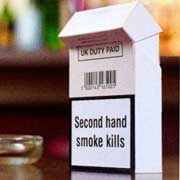 November 24, 2008 - Representatives of the 160 countries that have ratified the 2003 World Health Organization Framework Convention on Tobacco Control have been meeting in Durban, South Africa to discuss guidelines on the implementation of the treaty.
November 24, 2008 - Representatives of the 160 countries that have ratified the 2003 World Health Organization Framework Convention on Tobacco Control have been meeting in Durban, South Africa to discuss guidelines on the implementation of the treaty.
Among the proposals under consideration is a move towards generic or plain cigarette packs, with standardized colors, fonts and "only the most objective information," including a very large health warning, according to Heather Selin of the Framework Convention secretariat.
The FCTC treaty requires nations that have ratified the convention to ban all tobacco advertising and promotion. In the face of these restrictions, tobacco packaging has become the key promotional vehicle for the tobacco industry to interest smokers and potential smokers in tobacco products.
In an era of increased regulation, cigarette companies view packaging as their most "treasured advertising medium." (Becky Freeman, Simon Chapman, Matthew Rimmer, The case for the plain packaging of tobacco products, Addiction 103(4): 580-590, (3/13)2008, ABSTRACT
Andre Calantzopoulos, CEO, Philip Morris International (PMI), tells us PMI strongly opposes generic packaging. (PMI presentation at JP Morgan Global Tobacco Conference, London,
6/27/2008)
British (United Kingdom, UK) have been considering banning logos on cigarette packs, other measures.. Tobacco Journal International, September 2, issue reports that according to tobacco analyst, David Adelman from Morgan Stanley, if generic packaging becomes a legal requirement in the UK, not only could it have a domino effect on other markets, but it could also have an adverse impact on cigarette brand equity (and) could result in considerably reduced profits. Not only would a standardization of cigarette packaging drive down pricing and put an end to the appeal of premium cigarettes, which carry higher profit margins, but it would also lead to a rise in illicit cigarette trade." ('Plain packets' law to strip cigarettes of their glamour Tobacco industry is worried that a ban on branded cigarette packaging would undermine its sales by Denis Campbell, guardian.co.uk)
Also under discussion is a proposal to make pictorial health warnings, rather than text-only warnings, the norm on packs. The tobacco treaty merely states that health warnings "may" include pictures or pictograms. Some new brief examples: Gruesome Photos on British Cigarette Packs.., Horror photos go on New Zealand cigarette packs.. and Discouraging Tobacco Use - Horrific Images on the Packaging...
References: Calls for generic cigarette packs at anti-smoking summit in Durban, by DPA, Monsters and Critics.com, 11/21/2008; COP3 - Third session of the Conference of the Parties, WHO Framework Convention on Tobacco Control (WHO FCTC), November 17-22, 2008.
Read more...
Teens, Smoking Parents - Greatest Risk of Smoking..
 November 24, 2008 - A new study found that adolescents were at the greatest risk of smoking when their parents began smoking at an early age and the parents' smoking quickly reached high levels and persisted over time.
November 24, 2008 - A new study found that adolescents were at the greatest risk of smoking when their parents began smoking at an early age and the parents' smoking quickly reached high levels and persisted over time.
Jon Macy, project director of the Indiana University Smoking Survey in the Department of Psychological and Brain Sciences:"Of course, environmental influences on adolescents such as parenting practices, availability of cigarettes in the home, and parents' attitudes about smoking are equally as important and can be addressed with effective public health interventions including family-based smoking prevention programs."
Previous studies, many of which relied on parents' current smoking status only, offered mixed results about whether parental smoking is predictive of adolescent smoking.
Reference: Smoking, Teens and Their Parents: New Research ,Science Daily, 11/24/2008.
Ten Yrs Later the 1998 State Tobacco Master Settlement Agreement (MST)..
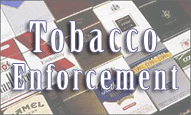 November 23, 2008 - Exactly 10 years ago on November 23, 1998, 46 states settled their lawsuits against the nation’s major tobacco companies to recover tobacco-related health care costs, joining four states — Mississippi, Texas, Florida and Minnesota — that had reached earlier, individual settlements. The tobacco companies agreed to a $246 billion settlement to be paid to the states over 25 years.
November 23, 2008 - Exactly 10 years ago on November 23, 1998, 46 states settled their lawsuits against the nation’s major tobacco companies to recover tobacco-related health care costs, joining four states — Mississippi, Texas, Florida and Minnesota — that had reached earlier, individual settlements. The tobacco companies agreed to a $246 billion settlement to be paid to the states over 25 years.
The states have failed to keep their promise to spend a significant portion of the money on programs to protect kids from tobacco and help smokers quit, according to a report released today by a coalition of public health organizations (see reference below). What happened to the money? States have spent less than 5 percent of their settlement proceeds on tobacco control. Many have used the money to help balance budgets, build schools and pave roads. The few that have invested more heavily in anti-smoking programs have lowered their smoking rates. (Over the past decade, the states have received $203.5 billion in tobacco-generated revenue, but they have spent only $6.5 billion on tobacco prevention and cessation programs. Only nine states are funding tobacco prevention at even half the CDC-recommended amount, and 27 states are providing less than a quarter of the recommended funding.)
Smoking rates are down. Twenty percent (from 36 percent) of high school students and 19.7 percent (from 25 percent) of adults still smoke, and tobacco use remains the nation's leading cause of preventable death.
Some states have borrowed against future payments from the tobacco industry, as a result they are now dependent on the continued vitality of cigarette sales. If Big Tobacco stumbles, states will be on the hook for these massive, billion-dollar loans. (Ten years later, tobacco deal going up in smoke by Bob Sullivan, RedTape.MSBNC.com, 11/21/2008)
Cigarette makers now do much more target advertising, using elaborate databases, direct mail and point-of-sale at convenience stores and adult-only venues like bars.
The tobacco industry continues to aggressively market its products. The tobacco companies spend nearly $19 to market tobacco products for every $1 the states spend to prevent kids from smoking and help smokers quit.
The report from the coalition of public health organizations (see reference below) calls on Congress and the states to follow the recommendations of recent landmark reports by the Institute of Medicine and the President's Cancer Panel, including enacting legislation granting the U.S. Food and Drug Administration authority to regulate the manufacturing, marketing and sale of tobacco products. Additionally, the states should further increase tobacco taxes, enact comprehensive smoke-free workplace laws and fund tobacco prevention programs at CDC-recommended levels.
On 10th Anniversary of 1998 Tobacco Settlement, Report Finds Most States Fail To Adequately Fund Tobacco Prevention Programs, Issued by the Campaign for Tobacco-Free Kids, American Heart Association, American Cancer Society Cancer Action Network, American Lung Association and Robert Wood Johnson Foundation, 11/18/2008.
Some related news briefs: Youth exposed to smokeless tobacco ads despite settlement…; April 2007 issue of Glamour had a 2-page Camel No. 9 ad on a thicker single page (front and back) in the center of the magazine..; Tobacco ads now even appears in PC Magazine (June 5, 2007).. and Camel by R.J. Reynolds Tobacco has a new...
Read more...
Kentucky considering increase in cigarette tax..
 November 23, 2008 - Kentucky is facing a $450-million shortfall this fiscal year. It is a financial mess that has Kentucky leaders looking at a cigarette tax to help dig them out of that hole. So people wonder if the additional monies raised from the an approved tobacco tax increase would be directed at health care, including a Medicaid stop-smoking program.
November 23, 2008 - Kentucky is facing a $450-million shortfall this fiscal year. It is a financial mess that has Kentucky leaders looking at a cigarette tax to help dig them out of that hole. So people wonder if the additional monies raised from the an approved tobacco tax increase would be directed at health care, including a Medicaid stop-smoking program.
Higher taxation is the most effective way to discourage smoking, especially among youths, and reduce health costs associated with cigarettes.
Kentucky, which leads the nation in adult smoking, taxes cigarettes at 30 cents a pack, one of the lowest rates in the nation. This state has the nation's highest rate of lung-cancer deaths and some of the highest rates of heart disease, stroke, premature births and other smoking-associated ailments. Kentucky had high rates of five cancers: lung, larynx, kidney, esophageal and cervical.
Reference: Kentucky urged to raise cigarette tax by Deborah Yetter, Courier-Journal.com, 11/20/2008 and Former Clinton Surgeon General talks about Kentucky's cigarette tax plan by Shayla Reaves, wave3.com, 11/22/2008.
Governor Ernie Fletcher signed the legislation into law, requiring that all cigarettes sold in Kentucky as of April 2008 be low-ignition strength (or fire-safe) as established by recognized standards. More..
Read more...


To Provide Public Awareness
Purpose
About Us
Contact Us
2008 HIGHLIGHTS
TOPIX PAPERS - 2008 & 2009..
Archive
-
▼
2008 (578)
-
▼
11/23 - 11/30 (12)
- SNUS Ewa Björling, Sweden's trade minister more co...
- Cigarettes “fire safe” in Minnesota as of December...
- Canada - Police arrest 46 in tobacco crackdown..
- Jakarta, Indonesia - Malls help enforce non-smokin...
- India - placing pictorial warnings on tobacco prod...
- Don't patronize places where people are smoking..
- Indonesia - federal anti-smoking laws in one year ...
- West Virginia another Camel SNUS test market..
- WHO FCTC Durbin Meeting (Nov 17-22, 2008) - Gene...
- Teens, Smoking Parents - Greatest Risk of Smoking..
- Ten Yrs Later the 1998 State Tobacco Master Settle...
- Kentucky considering increase in cigarette tax..
-
▼
11/23 - 11/30 (12)